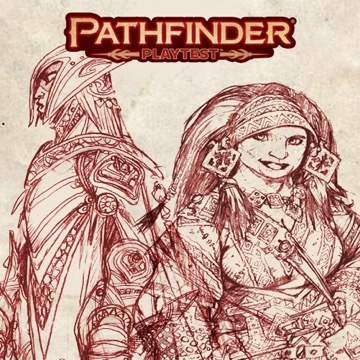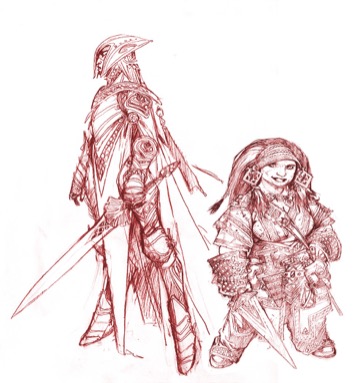You know, after all this time being stuck next to each other in game books, dwarves and elves might be getting pretty sick of each other. Well, too bad for them—they get no respite in the Pathfinder Playtest! Today, we'll be looking ahead to the newest versions of these classic folk by delving into their ancestry entries.
Dwarves
Adventuring is for the stout-hearted. Be stable. Be dependable. Be a dwarf! These fine folk live in isolated citadels, their surface empire having fallen long ago, but from time to time they venture out into the world of adventure.
As a dwarf, you get three ability boosts: one to Constitution, one to Wisdom, and one to the score of your choice. You take an ability flaw to Charisma, though your clan mother says you're quite charming. You get 10 Hit Points from your ancestry—more than the other ancestries and MUCH more than the elves! Your speed is 20 feet, perfectly adequate for adventuring, and you can ignore the speed reduction from your armor. You speak Common and Dwarf, as you may expect, and you can see in the dark just fine.
All that represents what's common to all dwarves, and comes from their innate tendencies. Ancestry feats go farther, reflecting mostly the cultural propensities of the ancestry. For example, you likely grew up among your dwarven kin, training with the weapons of the Weapon Familiarity feat. Battleaxes, picks, warhammers... those are good, dependable weapons. And let's not forget the special weapons with the dwarf trait, like the dwarven waraxe or your beloved clan dagger (forged for you at birth and capped with a gemstone sacred to your clan). Your training might have included the best ways to battle creatures like derros, duergar, giants, or orcs. In that case, you might pick up the Ancestral Hatred feat to give you a bonus on damage against these enemies—a bonus that goes up for 1 minute if one of those wretched creatures critically hits you!
Now, this isn't to say ancestry feats deal exclusively with your upbringing. Heritage feats are a special type of ancestry feat that reflect special physiological traits of your ancestry. Because they're inborn, you can select them only at 1st level. Hardy is one of these, letting you resist poisons and recover from them more quickly. (This kept Ron Lundeen's dwarven barbarian up during a recent playtest—even though he was still pretty sick, he didn't take any damage during all those rounds he spent retching after getting exposed to a poison!)
Because each ancestry entry is your starting point, it also gives you some ideas for how you might build or advance your character. For instance, the dwarf suggests backgrounds suitable for many sorts of dwarves (acolyte, nomad, or warrior) or for those who specifically follow a traditional dwarven way of life (barkeep, blacksmith, farmhand, and merchant).
Elves
An elf can live up to 600 years, an amount of time fit for appreciating the beauty of the natural world, of elegant arts, and of refined magic. Demons may haunt ancient elven lands, but you have plenty of time to plan their demise.
Elves' grace gives them an ability boost to Dexterity, and their years of study give them one to Intelligence. Their third ability boost can represent the other score they developed over the years. Their physical frailty is represented by their ability flaw in Constitution, as well as their low racial hit points of 6. They speak the Common and Elf languages, and are likely to have an Intelligence high enough to select a third language. Elves can see in dim light, and have the highest speed of all the ancestries at 30 feet. (Going to three actions per round brought the other ancestries that were as fast as elves in Pathfinder First Edition down to 25 feet from 30.)
Elves' ancestry feats can help them fight demons, teach them arcane cantrips, or make their hearing better with the Keen Hearing heritage feat. Elves can pick up many things in their long lives, and the Ancestral Longevity feat reflects how some of their life experiences might fade from the forefront of their memory until they focus on them. This feat allows your elf to become trained in a skill of your choice when she prepares for each day. If elves' 30-foot speed isn't enough for you, you can even take the Nimble feat, which increases your speed by 5 feet and lets you ignore a square of difficult terrain during each stride action you take.
Good background options for elves include hunter for those raised in the wild; noble or scholar for more cosmopolitan elves; and acrobat, entertainer, or scout for an elf with a more adventurous bent. Elves make good rangers or rogues, and those who wish to study spells can pursue the path of the wizard.
So which do you think has it better? Elves or dwarves? We'll let you think about that and see you again here on Monday, when we talk about another class elves' Intelligence points toward: the alchemist!
Logan Bonner
Designer


